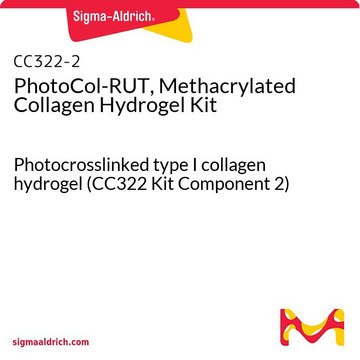CC320-2
PhotoCol-IRG, Methacrylated Collagen Hydrogel Kit
Photocrosslinked type I collagen hydrogel (CC320 Kit Component 2)
About This Item
Recommended Products
application(s)
cell analysis
General description
Application
Packaging
Components
Quality
Disclaimer
Hazard Statements
Precautionary Statements
Hazard Classifications
Aquatic Chronic 2
Storage Class Code
10 - Combustible liquids
Certificates of Analysis (COA)
Search for Certificates of Analysis (COA) by entering the products Lot/Batch Number. Lot and Batch Numbers can be found on a product’s label following the words ‘Lot’ or ‘Batch’.
Already Own This Product?
Find documentation for the products that you have recently purchased in the Document Library.
Articles
Methacrylated collagen, hyaluronic acid, and gelatin (GelMA) hydrogels can be crosslinked with light and photoinitiators (Irgacure/LAP/Ruthenium), used as 3D cell culture scaffolds and bioinks for bioprinting.
Hydrogela are the most widely used systems for 3D cell culture. Learn more about this technology (what are hydrogels? How to chose?)
Our team of scientists has experience in all areas of research including Life Science, Material Science, Chemical Synthesis, Chromatography, Analytical and many others.
Contact Technical Service








